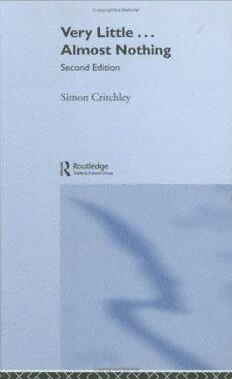
Very Little ... Almost Nothing: Death, Philosophy and Literature PDF
Preview Very Little ... Almost Nothing: Death, Philosophy and Literature
Very Little . . . Almost Nothing ‘This is a very brave book ... it makes philosophical conversation possible again after two decades of pragmatist intolerance.’ Roger Poole, Parallax ‘(T)his is an often beautifully written philosophical act of mourning.... It fi also commands respect because it obliges one to examine the ctions one employs to avoid really doing philosophy. Critchley’s steadfastly post- Kantian rejection of theological answers to the questions he asks is very welcome.’ Andrew Bowie, Radical Philosophy ff ‘Very Little ... Almost Nothing manages with some aplomb, to pull o the ffi extraordinarily di cult task of saying something new and interesting about Beckett and Blanchot.’ Martin McQuillan, New Formations ‘Critchley keeps his writings for the most part powerful and elegant, wide-ranging but well-focussed. The book is at all times sibylline, moving, insightful, explorative.’ Colin Davis, French Studies ‘Altogether beautifully written, with rich and deep insights. It is the most original and enlightening book I know about the so-called nihilism of present times and its genealogy and a key book for the understanding of the contemporary condition of man.’ Michel Haar, Université de Paris Very Little ... Almost Nothing is a profound but secular meditation on the theme of death, putting the question of the meaning of life back at the centre of intellectual debate. Simon Critchley traces the idea of nihilism from Jena Romanticism to Cavell and Blanchot, culminating in a reading of Beckett, in many ways the hero of the book. This second edition has added fl a revealing new preface, and a new chapter on Wallace Stevens which re ects on the idea of poetry as philosophy. Simon Critchley is Professor of Philosophy at the New School for Social Research, New York and at the University of Essex, and Directeur de Programme, College International de Philosophie, Paris. He is author and editor of many books including The Ethics of Deconstruction and On Humour (also published by Routledge). Very Little . . . Almost Nothing Death, Philosophy, Literature Second Edition Simon Critchley First published 1997 by Routledge 11 New Fetter Lane, London EC4P 4EE Simultaneously published in the USA and Canada by Routledge 29 West 35th Street, New York, NY 10001 Second edition published 2004 Routledge is an imprint of the Taylor & Francis Group This edition published in the Taylor & Francis e-Library, 2004. © 1997, 2004 Simon Critchley All rights reserved. No part of this book may be reprinted or reproduced or utilized in any form or by any electronic, mechanical, or other means, now known or hereafter invented, including photocopying and recording, or in any information storage or retrieval system, without permission in writing from the publishers. British Library Cataloguing in Publication Data A catalogue record for this book is available from the British Library Library of Congress Cataloging in Publication Data Critchley, Simon, 1960– Very little – almost nothing : death, philosophy, literature / Simon Critchley. 2nd ed. London; New York: Routledge, 2004. p. cm. Includes bibliographical references and index. 1. Philosophy, Modern. 2. Literature, Modern – History and criticism. 3. Nihilism. 4. Death. B791.C75 2004 149/.8 – dc22 2003026327 ISBN 0-203-46293-9 Master e-book ISBN ISBN 0-203-67185-6 (Adobe eReader Format) ISBN 0–415–34048–9 (hbk) ISBN 0–415–34049–7 (pbk) In memory of William James Critchley Born 10th February 1929 Died 28th December 1994 Images: Five Drawings – Very Little ... Almost Nothing – David Connearn 2003 Contents Abbreviations xi Preface to Second Edition: As my father, I have already died xv Preamble: Travels in Nihilon 1 (a) Philosophy begins in disappointment 2 (b) Pre-Nietzschean nihilism 4 (c) Nietzschean nihilism 8 fi (d) Responding to nihilism: ve possibilities 11 (e) Heidegger’s transformation of Nietzschean nihilism 15 (f) Heidegger contra Jünger 18 (g) Impossible redemption: Adorno on nihilism 21 (h) Learning how to die – the argument 29 Lecture 1: Il y a 35 (a) Reading Blanchot 35 (b) How is literature possible? 40 (c) Orpheus, or the law of desire 48 (d) Blanchot’s genealogy of morals: exteriority as desire, exteriority as law 52 (e) Il y a – the origin of the artwork 56 fi (i) rst slope – Hegel avec Sade 57 (ii) second slope – a fate worse than death 63 (iii) ambiguity – Blanchot’s secret 71 (f) The (im)possibility of death – or, how would Blanchot read Blanchot if he were not Blanchot? 77 fi (g) Holding Levinas’s hand to Blanchot’s re 85 vii Contents (i) a dying future 85 (ii) atheist transcendence 89 Lecture 2: Unworking romanticism 99 (a) Our naïveté 99 (i) Kantian fragmentation 102 (ii) deepest naïveté – political romanticism 105 (iii) Hegel, Schlegel 110 (iv) romantic modernity 113 (b) Digression I: Imagination as resistance (Wallace Stevens) 114 (c) Romantic ambiguity 123 (i) the fragment 125 (ii) wit and irony 131 (iii) the non-romantic essence of romanticism 135 (d) Cavell’s ‘romanticism’ 138 (i) the romanticization of everyday life 138 (ii) Emerson as the literary absolute 141 (e) Digression II: Why Stanley loves America and why we should too 147 (f) Cavell’s romanticism 154 (i) I live my scepticism 155 (ii) Cavell’s tragic wisdom 157 fi (iii) niteness, limitedness 161 Lecture 3: Know happiness – on Beckett 165 (a) Beckett and philosophical interpretation 165 (b) The dredging machine (Derrida) 169 (c) The meaning of meaninglessness and the paradoxical task of interpretation (Adorno I) 172 (d) Hope against hope – the elevation of social criticism to the level of form (Adorno II) 181 (e) Nothing is funnier than unhappiness – Beckett’s laughter (Adorno III) 184 (f) Storytime, time of death (Molloy, Malone Dies) 188 (g) My old aporetics – the syntax of weakness (The Unnameable) 195 viii Contents (h) Who speaks? Not I (Blanchot) 202 (i) No happiness? (Cavell) 207 Lecture 4: The philosophical significance of a poem – on Wallace Stevens 215 Notes 237 Acknowledgements 270 Index 273 ix
